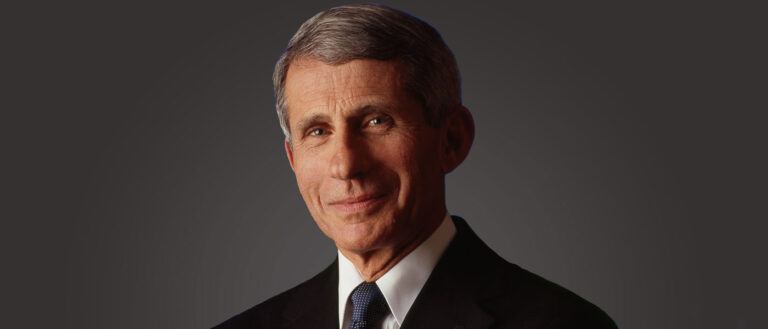Physician, immunologist and infectious disease expert has saved millions of lives through dedication to research and public health
The Inamori International Center for Ethics and Excellence at Case Western Reserve University will award Dr. Anthony Fauci, a physician, immunologist, and infectious disease expert, with the 2024 Inamori Ethics Prize.
“Dr. Fauci has cared not only for the nation’s health, but also the health of the world,” said Case Western Reserve President Eric W. Kaler. “As a scientist, research leader and public health advisor, his contributions to scientific discovery have truly improved lives. His leadership through one of the most challenging times in history—the COVID-19 pandemic—serves as a model for us all.”
The Inamori Ethics Prize has been awarded since 2008 to honor outstanding international ethical leaders whose actions and influence have greatly improved the condition of humankind. Dr. Fauci will receive the prize, deliver a free public lecture about his work and participate in an academic symposium panel discussion during Inamori Center events Sept. 19, 2024, on the Case Western Reserve campus.
Soon after completing his internal medicine residency, Dr. Fauci joined the National Institute of Allergy and Infectious Diseases (NIAID) at the National Institute of Health (NIH) in 1968 as a clinical associate. He went on to become a section head and a lab chief before being appointed NIAID director in 1984.
Dr. Fauci managed these positions while continuing to conduct research and treat patients. He discovered treatments for formerly fatal diseases and contributed to the global medical community’s understanding of the human immune system. His research is among the most cited in the world.
Dr. Fauci continued to serve as NIAID director for nearly 40 years, advising every United States President, from Ronald Reagan to Joe Biden, until his retirement from NIAID at the end of 2022. During his tenure, Dr. Fauci led pivotal research for diseases such as HIV/AIDS, SARS, swine flu, MERS, Ebola, tuberculosis, malaria, Zika and COVID-19.
Dr. Fauci currently serves as Distinguished University Professor in the Georgetown University School of Medicine’s Department of Medicine. He holds an additional appointment in the university’s McCourt School of Public Policy.
“We are incredibly proud to recognize Dr. Fauci with the Inamori Ethics Prize and shine a bright light on the impact his ethical leadership has made to science and to humanity,” said Joy K. Ward, Case Western Reserve interim provost and executive vice president.
During the AIDS epidemic, Dr. Fauci researched treatments and vaccines and was a key architect of the President’s Emergency Plan for AIDS Relief, resulting in the saving of 25 million lives in the developing world. His leadership was crucial during the H1N1 swine flu pandemic in 2009, as well as the Ebola virus crisis in 2014.
Dr. Fauci was at the forefront of the national response to the COVID-19 pandemic, overseeing a large research portfolio of basic, translational and clinical research and advising the federal government on best public health practices to slow the spread of the virus. He advocated for international scientific collaboration to achieve effective medical solutions and endorsed the development of a universal coronavirus vaccine that could be used to prevent future pandemics. Dr. Fauci also served as an advocate for scientific reasoning and science itself to help combat rampant and dangerous misinformation.

“Despite immense pressure, unfounded challenges to his expertise, personal attacks and even death threats, Dr. Fauci never wavered in his insistence that policy must follow the science, because he understood lives were at stake,” said Shannon E. French, Inamori Professor in Ethics and director of the Inamori Center.
Previous Inamori Ethics Prize winners:
- 2023: Myroslava Gongadze (Ukraine), journalist, free-press and human rights advocate
- 2022-23: Conversations on JUSTICE: Inequities in Healthcare (in honor of the late Dr. Paul Farmer)
- 2021: Judge Silvia Fernández de Gurmendi (Argentina), international human rights expert, diplomat, judge and former president of the International Criminal Court
- 2020-21: Conversations on JUSTICE (a series of virtual events featuring former prize-winners during the height of the pandemic)
- 2019: Mr. LeVar Burton (Germany and USA), creative arts, literacy and HIV/AIDS advocate
- 2018: Dr. Farouk El-Baz (Egypt and USA), NASA Apollo program scientist and conservationist
- 2017: Marian Wright Edelman (USA), founder of the Children’s Defense Fund, civil rights activist
- 2016: Prof. Peter Eigen (Germany), lawyer, economist, anti-corruption pioneer and founder of Transparency International
- 2015: Prof. Martha Nussbaum (USA), ethics scholar and UN advisor philosopher, professor, author, board member of the Human Rights Program
- 2014: Dr. Denis Mukwege (Democratic Republic of the Congo), physician, advocate against sexual violence, 2018 Nobel Peace Prize recipient
- 2013: Yvon Chouinard (USA), corporate social responsibility entrepreneur, environmentalist
- 2012: Dr. David Suzuki (Canada), academic environmentalist, scientist and broadcaster
- 2011: Advocate Beatrice Mtetwa (Zimbabwe), lawyer, human rights and press freedom activist
- 2010: Stan Brock (UK), philanthropist and founder of Remote Area Medical (now deceased)
- 2009: The Honorable Mary Robinson (Ireland), Elder, humanitarian, and former President of Ireland
- 2008: Dr. Francis Collins (USA), physician, geneticist, former director of the NIH


